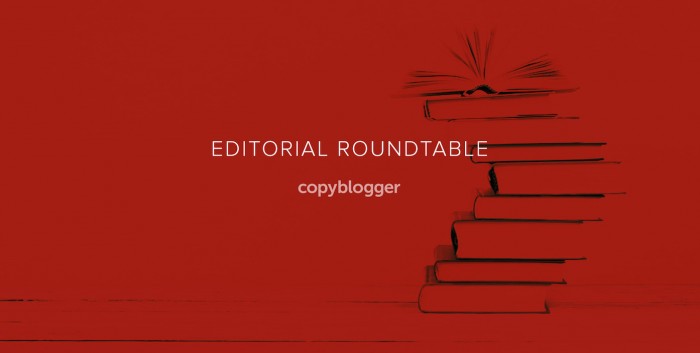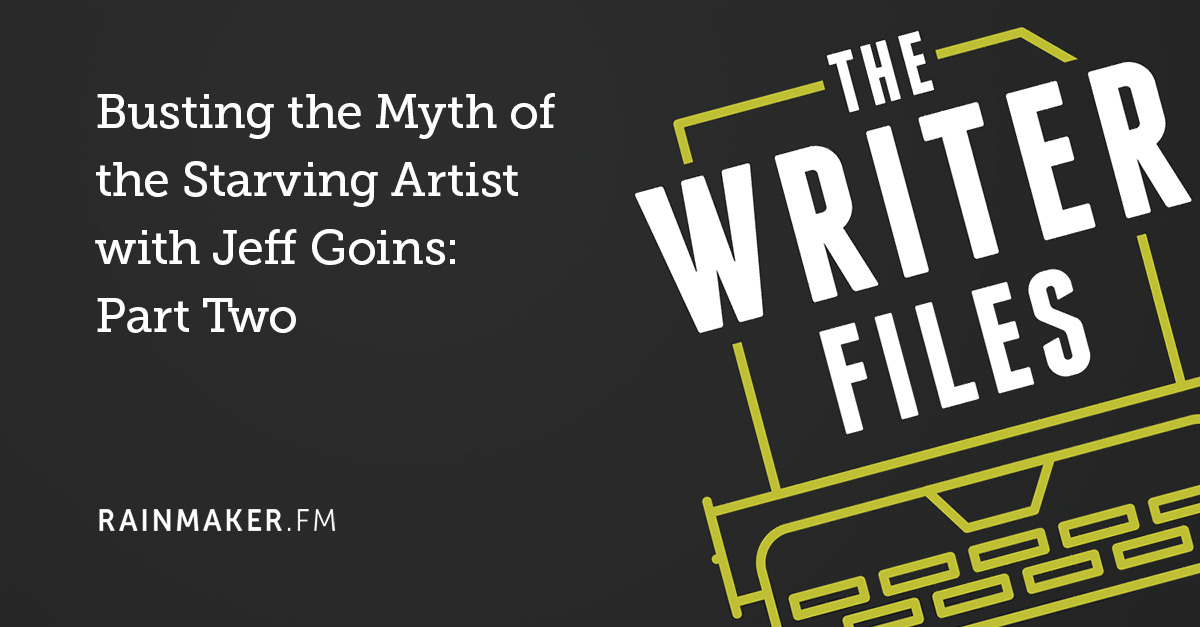
I don’t believe in a “writing gene.”
Writing comes more easily to some folks, for sure. But those aren’t always the people who end up writing really well.
Writing is a skill that requires plenty of practice. But practice is always more effective when you’re working on the right things.
That’s when it’s time to seek out some good advice.
This week, we asked Copyblogger’s editorial team to share some of their favorite writing books. There’s a mix here — some books are about the art of writing, some about craft, and some about strategy.
Any of them will help you put your words together in more powerful ways.
Here are the recommendations, in each writer’s own words:
Brian Clark
Fun Fact: I’ve never read a “normal” writing book, only copywriting and screenwriting books. So:
Advertising Secrets of the Written Word, Joe Sugarman
I have a lot of copywriting books and courses, and if I were starting out from square one today, I’d start here. Joe Sugarman is a direct marketing legend, and he does a great job of getting basic copywriting concepts across in an enjoyable way. So if you’re brand new to copywriting, this is where to go.
Editor’s note: This edition of Sugarman’s book is out of print, but was reissued as The Adweek Copywriting Handbook.
Breakthrough Advertising, Eugene Schwartz
For the advanced, here’s the money book, courtesy of the late, great Gene Schwartz. When you’re ready to take it to the next level, this is what just about any highly successful copywriter will tell you is the Holy Grail of deep psychological insights that lead to breakthrough marketing campaigns.
Stefanie Flaxman
The 22 Immutable Laws of Marketing: Violate Them at Your Own Risk!, Al Ries and Jack Trout
It’s a quick read, but every time you pick it up as you progress on your marketing journey, something new clicks into place or it sparks new ideas for a project you’re working on.
And I’m going rogue on my second submission 😉 …
My suggestion is to treat every book (or article) you read as a lesson. Why do you like the writing? Why do you dislike the writing? If you answer those questions and study the craft of other writers, you can improve your own writing. See if you can adapt the qualities you like to fit your own style — and avoid the qualities you dislike.
Robert Bruce
The Unpublished David Ogilvy
Though he is most famous/infamous for his industry-shattering Ogilvy on Advertising, Unpublished offers a deeper look into the original Mad Man. His tactics, motives, and strategies are laid bare … not to mention some of the funniest internal memo writing you’ll ever read.
Selected Letters (3 Volumes), Charles Bukowski
Another case (for me) in which the writer’s offhand, non-staged work seems so much more alive than what he is known for. Or, maybe I’m just too old and too dead inside to reach for his poetry and fiction over this fascinating, exploding, and beautifully human correspondence.
Jerod Morris
On Writing, Stephen King
I love On Writing. It cuts through all the bullshit and gets right to the heart of what it means to write. “Life isn’t a support-system for art. It’s the other way around.”
The War of Art, Stephen Pressfield
It actually shares some over-arching thematic similarities to King’s in how uncompromising they are about the commitment it takes to be a good writer, and how writing isn’t about staring out a window and waiting for the muse … but strapping on your work boots, sitting down, and typing.
Kelton Reid
Besides the obvious — Cialdini, Ogilvy, Schwartz, Hopkins, Godin, McKee, King, Clark, Simone, and Bruce — I have a few other go-to faves:
Steal Like an Artist, Austin Kleon
New York Times bestselling author Austin Kleon has been called “one of the most interesting people on the Internet” by The Atlantic magazine. An authority on “creativity in the digital age,” this guide offers the message: “You don’t need to be a genius; you just need to be yourself.”
Daily Rituals: How Artists Work, Mason Currey
How did the greats get it done? If you’re like me and you nerd-out on the processes of annoyingly productive creatives, this is for you. A well-written survey of the daily rituals of 161 novelists, poets, playwrights, painters, philosophers, and more, on how they “… get done the work they love to do, whether by waking early or staying up late.”
Process: The Writing Lives of Great Authors, Sarah Stodola
Accomplished journalist, editor, and creative nonfiction author Sarah Stodola compiled a fascinating collection of the habits and habitats of heralded scribes titled, Process: The Writing Lives of Great Authors. Much word-nerdery here. Enjoy!
Sonia Simone
Since I put this together, I got the benefit of seeing what everyone else wrote. I share a lot of the favorites above, but here are a few that my colleagues didn’t mention.
Writing Down the Bones, Natalie Goldberg
I read this over and over when I was just a wee writer, and it’s always stuck with me. Goldberg talks about writing as a Zen meditative practice, and this is a book that can help you get out of your own way and start to find your writing voice.
The Writer’s Journey: Mythic Structures for Writers, Christopher Vogler
These days everyone and their Aunt Frances has written about the “hero’s journey” and how it informs the stories we tell. Vogler was one of the first, and his book (intended for screenwriters) has lots of juicy ideas you can swipe to inform the stories we tell with content today.
Marketing Bullets, Gary Bencivenga
It’s well worth your time to seek out copywriting advice that was written for direct response — particularly what we usually call “junk mail.” These writers had to make every syllable work hard to offset the high costs of a direct mail campaign. Gary Bencivenga was one of the most successful writers ever to work in that format.
His advice “bullets” are old-school (sometimes they might even strike you as cheesy), but they’re still smart and they’re still powerful. Reworking them so they make sense in today’s environment and with your individual voice will make anyone a more effective and persuasive writer.
All Marketers are Liars and Permission Marketing, Seth Godin
Seth fills out the other side of the persuasion equation. You want to express yourself clearly and give people the information they need to make a buying decision — that’s what copywriting techniques are for.
But you also need to speak to the desire for belonging, the yearning for connection and shared values, that marks every human society, past or present. That’s what Seth’s books and blogs are for. I found these two particularly useful, but if you have a different favorite, of course I want to hear about it below. 
How about you?
Do you have any favorite writing books? Are they more “art of writing” or “science of persuasion?”
Let us know in the comments …


![[08] 10 Goals that Make Content Marketing Meaningful](../../rainmaker.fm/wp-content/uploads/2017/07/sites-008.jpg)


Hi Sonia,
Seth’s stuff resonates so strongly with me because he does stuff from manifestation, not manipulation. I think many marketers mean well but so many write from a place of scarcity versus abundance, allowing their fear of loss factor in to manipulate marketing ways. Seth goes the opposite route; his writing and books rock because he lays it all out for the consumer to make the choice.
We all do our fair share of manipulating, persuasion and the like. But balance that out with a higher energy, generous, more detached intent and you can REALLY make things pop. Be clear, be direction, be bold and be honest in all you do.
As for writing, I have written 1000 words or more daily for the past few years. For practice, and for publishing. Sure hasn’t hurt me Best learning tool I never used; my own fingers, typing away at a keyboard in silence.
Best learning tool I never used; my own fingers, typing away at a keyboard in silence.
Thanks for this fabulous list Sonia. Tweeting of course
Ryan
Thanks Ryan
Ryan, your comment about scarcity vs. abundance resonated with me so much! I agree 100%. Thanks for the awesome reminder.
Thanks Ryan; I’m with you on this. Writer types get all flustered about nobody reading our precious content or nobody buying the products we so diligently endorse. If the content is good and the product is good, the sale will come. That’s my take.
Great list. Some of my favorites are among those listed here — The War of Art, On Writing. Then there’s Anne Lamott’s Bird by Bird, and Liz Gilbert’s Big Magic, two others that inspire me to be a better writer.
A fantastic book I read recently, though not about strictly about craft, had the effect of making me want to put the book down and write every time I finished a chapter — The Accidental Life: An Editor’s Notes on Writing and Writers, by Terry McDonell. It was a rollicking good read, as they say.
For copywriting resources, the Gary Halbert Letter is pretty swell. A couple of Dan Kennedy’s books are on my bookshelf, and a transcript of Eugene Schwartz’ Philips Publishing talk always fires me up when I need copywriting inspiration.
Anything by Chip & Dan Heath. They’re not about writing per se but you can inform your writing with a lot of their principles. And they’re just written so well!
Just picked up a copy of Breakthrough Advertising. I had not heard of it before, so thanks for the recommendation, looks like it is right up my alley. You’re all on point with these suggestions, but I really appreciate Brian’s, that was helpful!
Thanks for the list. Writing books that I have on my bookshelf that I think are well worth a read are; Accidental Genius by Mark Levy, which advocates free writing to get unstuck, Writing Tools: 50 Essential Strategies for Every Writer by Roy Peter Clark and How to Write A good Advertisement by Victor A Schwab (an older book 1962 but contains some great principles probably similar to Sugarman).
I do not find writing easy.